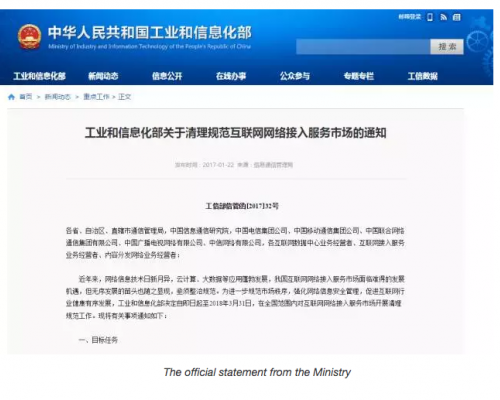Travelling to China on business? Think about using a VPN
25 January 2016 - RPS Partnership
Anyone who has ever travelled to China on business will know that the Government is paranoid about digital security. Using a VPN (Virtual Private Network) is a must to by pass the blanket firewalls that they put up.
If you are travelling to China, contact us for more information and to speak to our DIGITIAL SECURITY EXPERT.
To put it into context for you: Numerous Internet users in China rely on VPNs to access sites blocked or censored by the government's Great Firewall, such as Google, YouTube, Facebook, Twitter, Tumblr, Dropbox, The Pirate Bay, The New York Times, The Wall Street Journal, and many others. Apple recently pulled New York Times apps from its Chinese App Store to comply with Chinese regulations.
Our research now tells us the following, which may assist you when planning business or tourist travel to the country.
China’s Ministry of Industry and Information Technology yesterday announced a major crackdown on VPN (virtual private network) services that encrypt Internet traffic and let residents access websites blocked by the country's so-called Great Firewall.
The ministry "said that all special cable and VPN services on the mainland needed to obtain prior government approval—a move making most VPN service providers in the country of 730 million Internet users illegal," reported the South China Morning Post, a major newspaper in Hong Kong.
China's tightening of its already strict Internet censorship may be preparation for this autumn's 19th National Congress of the Communist Party of China, at which new party leadership will be elected. Besides the VPN crackdown, China on Saturday shut down "two websites run by a liberal Chinese think tank" and 15 other websites, the Post reported.
BUT.....That terrifying VPN rumour isn't as bad as it seems. Here is more news which sheds some light.
Rumours began to spread, as people woke up in dread at the thought of a life without Facebook, Instagram, YouTube and abundant, easily accessible pornography. Thankfully, though, it seems personal users will be unaffected by the new regulations, with the MIIT (Ministry of Industry and Information Technology of the People's Republic of China) announcement referring solely to enterprises.
So what does it mean for businesses?
Before March 31, 2018, companies looking to use 'special connections' will have to register an approved account with the telecommunications authorities, detailing exactly what they will be using said connection for. It ordered checks for companies operating without government licenses or beyond the scope of licenses.
Business VPNers, best advice would be to seek clarification on what to do next, but if you just use a VPN for leisure and/or pleasure, then click away. Again, personal VPN use is not referenced in the announcement – they are as legal as they ever were. Which is still something of a grey area...
The latest crackdown has caused a stir on the internet, with many social media users complaining that their VPN services had failed or slowed down. Some expressed fears of losing touch with the outside world or of being held accountable by security forces for using a VPN system.
On Twitter, GreatFire.org notes that the new regulations target domestic VPN services and not domestic users, highlighting that foreign VPN providers have long been in government crosshairs. Last year, as VPN reliability was faltering in China, GreatFire launched Circumvention Central, a realtime VPN information database that monitors the speed and stability of leading services.
Greatfire.org’s Charlie Smith said that the measures predominantly affect domestic players.
“Foreign ones will be largely unaffected unless they offer their customers a China server, in which case they will probably have to register in China or drop the China server,” he said. “Most of them will do the latter.”
“Chinese VPN users know they are accessing information the authorities deem ‘inappropriate’, so potentially they could put themselves in danger if their service provider is working closely with the authorities,” he said.
Reactions in China
Reactions on Chinese social media vary, with many "netizens" making sarcastic comments about the news. “Wouldn’t it just be better to cut off all Internet and shut down further contact with foreign countries?” some say.
Many others also comment: “Without a VPN, how can we now go on Facebook to show our patriotism and love for China?” [See CDT’s coverage of such patriotic displays by China’s “little pinks.”]
But there are also those who are confused on what the new regulations will mean for individuals, and many who are worried as they fear it will widen the gap between China and the rest of the world: “They will first restrict companies, then they will restrict individuals – it goes step by step.”
The Washington Post’s Emily Rauhala suggested that the new rules’ potential to further isolate Chinese internet users from the World Wide Web is ironic, coming on the heels of President Xi Jinping’s passionate defence of globalisation in Davos last week. Xi warned that protectionism was like “locking oneself in a dark room”:
The future
It is still unclear how, exactly, the new rules will be implemented. Often this type of announcement is deliberately vague. Internet companies in China are already closely regulated and VPNs providers are already subject to crackdowns — including one ahead of political meetings last March.
But experts on China’s Internet said the notice seems to take aim at Chinese companies providing VPN services to individuals in China — and not, say, those helping multinational companies connect with their home office.
Contact us at [email protected] for advice and training for travel to China and to speak to our digitial security expert. The following VPNs are still working: Astrill, VPNexpress, Freedome. Other less well known ones are too.
Sources:
Photo: official statement from the Ministry


